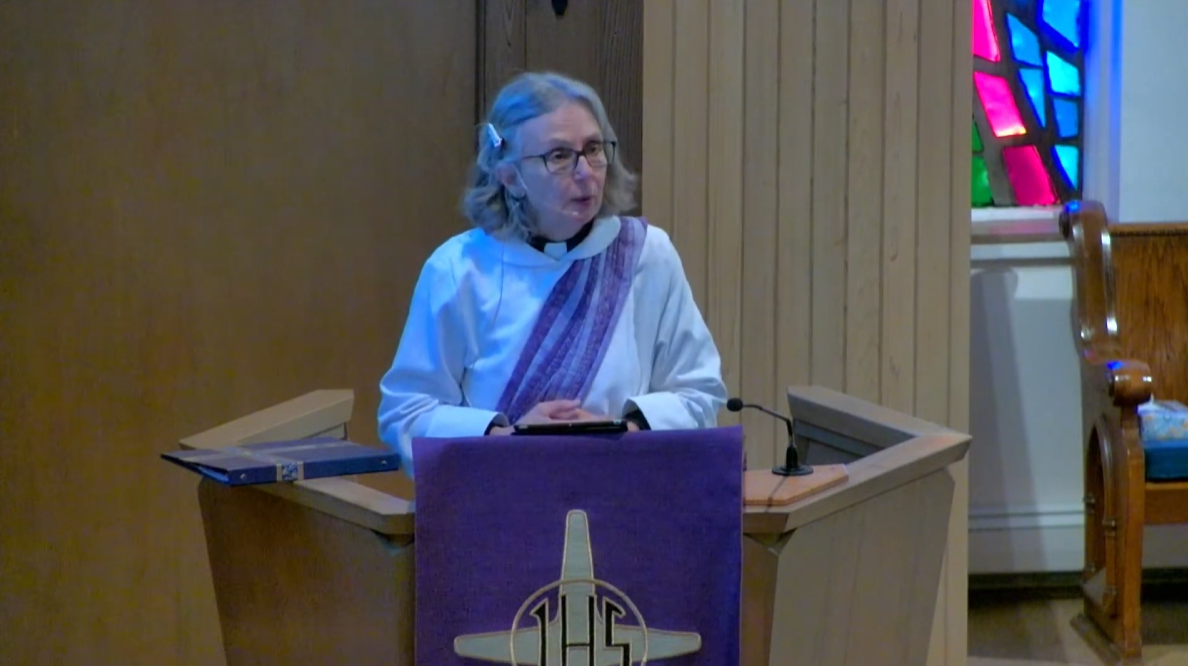Celebrate and Rejoice

I’ve been thinking about banquets this week; about sitting around the table with a group of people and eating and celebrating and rejoicing in being together; I’ve been pondering who is welcomed at the table and who is not.
This past Wednesday night I experienced a beautiful example of welcoming all people to the table. It happened when some of us gathered in fellowship hall for the 3rd in our series of Lent Soup Supper and Conversations. There were a number of children present that night. I noticed them playing together on the stage as we waited for the supper to begin. I recognized 4 of the 5 children who were there, as I have seen them here on Sunday mornings. I didn’t recognize the 5th child. As we were getting ready to eat, the children all came down off the stage, pulled out one of the round tables in the hall, set 5 chairs around the table, and created their own space to eat. Clearly, these children felt comfortable in that place. Soon it was time to sing grace and then people started going through the buffet line to get their choice of soup and bread and so much more. The child I did not recognize was standing off by himself near the children’s table, so I went over to introduce myself and find out about him. Turns out he was at Holy Trinity that night because his mom is a Scout leader for the pack that was meeting at the other end of the building. This child had met one of the Holy Trinity kids in the entry way and she had invited him down to the hall to play. I welcomed him, of course, and encouraged him to get something to eat. He politely told me his mom wanted him to check with her before having anything to eat. (I noticed he gave the same polite response to the 4-5 other adults who went over to speak with him as well.) That’s great, I said; just know that you are welcome to eat with us. So, he sat around the table with the other 4 children and there was chatter and laughter and joyous noise from that corner of the room and everyone at the kids’ table was included. All because one child saw another child – a child they did not know – by themselves, with nothing to do as the Scouts were meeting, and invited that child into the soup supper in Fellowship Hall, where the adults also welcomed him with joy.
For me, watching the children welcome the new kid and get to know each other around the table was a moment to celebrate and rejoice.
It was a God moment – a moment when judgment is put aside and the kin-dom of God breaks through our present reality and we receive a foretaste of God’s love and compassion and care for all people.
Our gospel story this morning offers us another example of welcoming people to the table; another moment celebration and rejoicing.
The story begins with the religious authorities listening to Jesus and grumbling about him because, as they complain, “This fellow welcomes sinners and eats with them.”
Yes, indeed – that is one of the things that Jesus does – he eats with anyone and everyone – tax collectors, disciples, women, men, children, sinners, priests, government officials – it’s all the same to Jesus. He eats with anyone who is willing to sit down with him at the table and talk and listen and hear how much God loves them and longs for them to turn to God and be well.
Jesus’ mission is to share the good news of God’s love and saving grace for all people; to share God’s extravagant welcome with everyone he meets in order to bring all people back into a right relationship with God.
Jesus tells the familiar parable of the prodigal and his brother to illustrate the breadth of his mission. Perhaps you know the story.
There was a man who had two sons. These two sons follow different paths in their lives but they share one thing in common – both jeopardize their relationship with their father by focusing on their own self-centered desires and disregarding the extravagant love, compassion, and welcome their father wants to share with them.
The younger son disrespects his father by demanding his inheritance while the father is still alive. After his father generously gives him more than his fair share, this son goes off and spends his wealth in wastefully extravagant ways (the meaning of ‘prodigal’) until he has no resources left. When the economy takes a down turn and life gets hard, the younger son finds himself destitute, with no choice but to work as a hired hand feeding pigs; a lowly and despicable job for a Jewish man to do. Soon he comes to his senses and makes the decision to return to his father and ask to be treated as a hired hand.
His father, of course, has other ideas. When the father sees his son approaching in the distance, he runs out – a highly undignified response for a man of his position – and greets him with a hug and a kiss; he welcomes him home him with love and compassion and without judgement.. Immediately the father calls for an extravagant celebration – complete with the best robe and a ring and a fatted calf.
For the father, this was a moment to celebrate and rejoice; for the child he thought he had lost has now been found; he has turned around and come back to restore his relationship with the father.
The elder son disrespects his father by becoming angry and refusing to join in the celebration and rejoicing for his brother’s return. This son has been working hard on his father’s property all the time his brother has been away living the good life. This son has had plenty of time to wallow in his own thoughts, out in the fields by himself; thoughts he had never shared with his father until this day when he explodes with bitterness and resentment. He is not yet willing to forgive his brother for leaving with his inheritance nor is he ready to celebrate his brother’s return. After all, his father has never celebrated all the work the elder son has done for the father over the years.
The elder son seems to forget that he has lived well in his father’s house during the years his brother was away and living squalor. Though surrounded by his father’s love and resources and care, the elder brother squanders his relationship with his father by feeling sorry for himself.
We’re not told if this elder son ever comes to his senses and makes the decision to return to his father and go into the celebration, rejoicing that his brother who was lost has now been found; we’re not told if he restores his own relationship with the father.
We do know that the father is waiting for the elder son to return to him. When he does, the father will run to him and greet him with a hug and a kiss; he will welcome him home with love and compassion and without judgement; he will celebrate and rejoice that the child that was lost has now been found; he has turned around and come back to restore his relationship with the father.
This is why Jesus eats with sinners – people like you and me and our families and friends and neighbors and enemies and even the most despicable and evil people we know – to remind us that God is always waiting for each one of us – all of us – to return home; waiting for us to turn around from going our own way (our way of greed or self-centeredness or resentment or bitterness) and come back to restore our relationship with God; God is always waiting to welcome us at the banquet table where Jesus is host and meal.
The good news for today is that God is longing for you to turn back and know that God loves you with an everlasting love; God is longing to greet you with a hug and a kiss and to welcome you home with love and compassion and without judgement; to celebrate and rejoice that your relationship with God has been restored; and you who were once dead are now alive in Christ Jesus.
And God is longing for you to share that same extravagant and loving welcome with everyone you meet, so that all people might be reconciled with God through Christ and God’s kin-dom comes on earth as it is in heaven.
Share the good news in your words and in your deeds; share the good news with joy and thanksgiving for all that God has given you.

